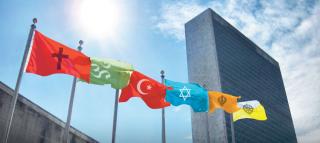Research by the Department of Religious Studies and the Department of Politics and International Relations suggests that Christianity still dominates the UN and that a more diverse system is needed to increase non-Christian representation in world-peace-making.
The report, titled ‘Religious NGOs and the United Nations’, was undertaken by Professor Jeremy Carrette with colleagues from both Religious Studies and Politics. It reveals that more than 70% of religious Non-Government Organisations (NGOs) at the UN are Christian and there is historical privilege in allowing the Holy See (Vatican) a special observer status, as both a state and a religion.
As a result, the report calls for greater awareness, transparency and equality for the way religious NGOs operate within the UN and more emphasis on religious tolerance. It also calls for greater understanding of how religions enhance and constrain human rights.
The research provides evidence that funding limits restrict other religious traditions from establishing NGO work at the UN and sheds light on the different means of access. Islam, for example, is represented more significantly through the collective of states (the Organisation of Islamic Cooperation) rather than civil society NGOs, which are dominated by Catholic groups. Asian religions, such as Hinduism and Buddhism, are under-represented and funding is a major issue in preventing their equal access.
The full report is available by emailing: RNGOproject@kent.ac.uk

